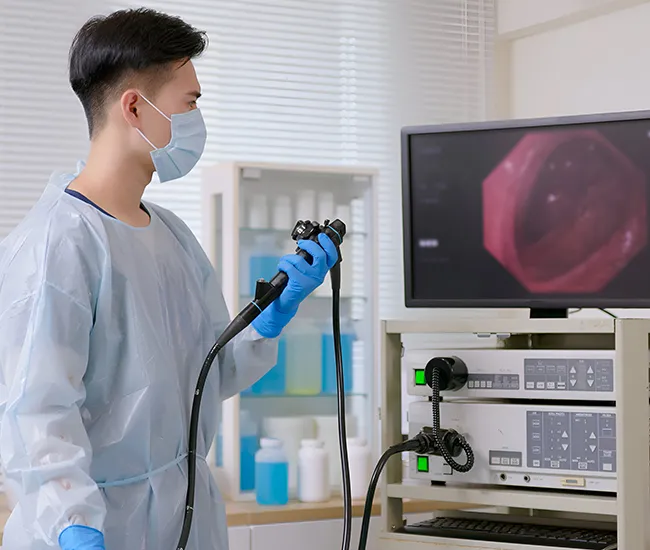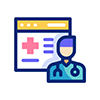


At Ashraya Hospital, we offer comprehensive endoscopy and colonoscopy services designed to help diagnose gastrointestinal issues effectively and ensure early detection of potential health concerns. With the latest equipment and techniques, our experienced gastroenterologists in Wakad and Pimpri-Chinchwad, Pune, provide high-quality diagnostic procedures to identify and manage a wide range of conditions, from common digestive issues to more serious gastrointestinal diseases.
Both endoscopy and colonoscopy are vital tools for evaluating your digestive health. Whether you're experiencing unexplained abdominal pain, digestive discomfort, or need routine screening, our compassionate specialists are committed to providing you with the best care.
Endoscopy is a medical procedure that allows doctors to examine the inside of the body using a flexible tube with a camera on the end. This procedure helps in diagnosing conditions affecting the gastrointestinal tract, such as the stomach, oesophagus, and duodenum. Endoscopy is often used for conditions like acid reflux, ulcers, gastrointestinal bleeding, and unexplained pain.
Types of Endoscopy We Offer:
Conditions Diagnosed with Endoscopy:
Colonoscopy is a procedure that allows doctors to examine the entire colon (large intestine) using a long, flexible tube with a camera. Colonoscopy is a crucial diagnostic tool for detecting issues such as colorectal cancer, polyps, and chronic conditions like ulcerative colitis and Crohn's disease. It's also recommended as a routine screening test for individuals over 50 or those with a family history of colon cancer.
Benefits of Colonoscopy:
At Ashraya Hospital, we are committed to providing the highest level of care for all your diagnostic needs. Here's why you should choose us for your endoscopy and colonoscopy procedures:

Our team of gastroenterologists are highly skilled in performing endoscopic and colonoscopic procedures with precision, ensuring accurate diagnosis and minimal discomfort.

We use the latest endoscopic and colonoscopic technology to ensure high-definition images for accurate diagnostics. Our equipment is regularly maintained and updated for optimal performance.

We prioritise patient comfort and safety during these procedures. Sedation options are available to help you feel relaxed and comfortable throughout the procedure.

We take a patient-centred approach, offering personalised care and guidance before, during, and after the procedure. Our team is always available to answer your questions and address any concerns.

Post-procedure care is crucial for recovery. We provide detailed instructions and follow-up consultations to ensure proper healing and address any potential concerns.
You should consider an endoscopy or colonoscopy if you experience any of the following symptoms:
Both endoscopy and colonoscopy are preventive measures for early diagnosis, especially if you're at higher risk for gastrointestinal diseases due to factors such as family history, age, or previous medical conditions.
If you are experiencing symptoms like persistent abdominal pain, digestive discomfort, or have a family history of colorectal conditions, it's time to consider endoscopy or colonoscopy. At Ashraya Hospital, we offer expert diagnostic care for all your gastrointestinal needs. Our team is dedicated to providing accurate results and personalised treatment to ensure your digestive health.
You will be given specific instructions depending on the procedure. For a colonoscopy, you may need to follow a clear liquid diet and take a bowel prep to ensure your colon is clean. Endoscopy generally requires fasting for several hours before the procedure.
Most patients experience minimal discomfort during the procedures due to sedation or local anaesthesia. You may feel some mild discomfort afterwards, but it usually subsides quickly.
In most cases, results are available within a few days to a week, depending on whether biopsies or additional testing are required.
If you were sedated, it's recommended that you arrange for someone to drive you home. You may feel a little groggy after the procedure, so it's important to avoid driving.
For individuals at average risk, colonoscopy screenings are recommended starting at age 50 and should be done every 10 years. However, if you have a family history of colorectal cancer or other risk factors, your doctor may recommend more frequent screenings.